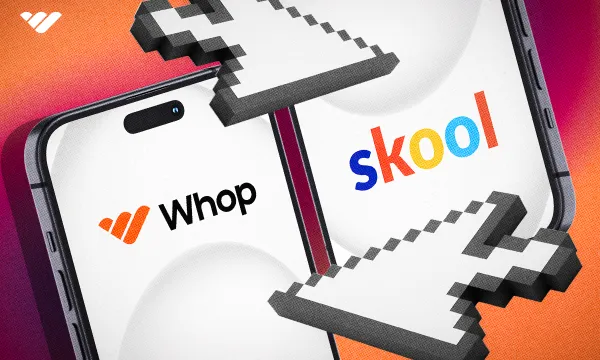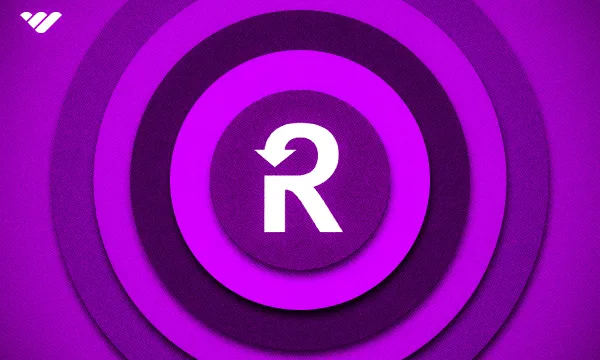Stan Store is a popular creator monetization platform, and plenty of creators and digital entrepreneurs have used it to turn side hustles into profitable companies.
But is Stan Store the best creator monetization platform out there, and can you do even better for yourself and your content creation business by choosing an alternative? Let’s find out!
What is Stan Store?
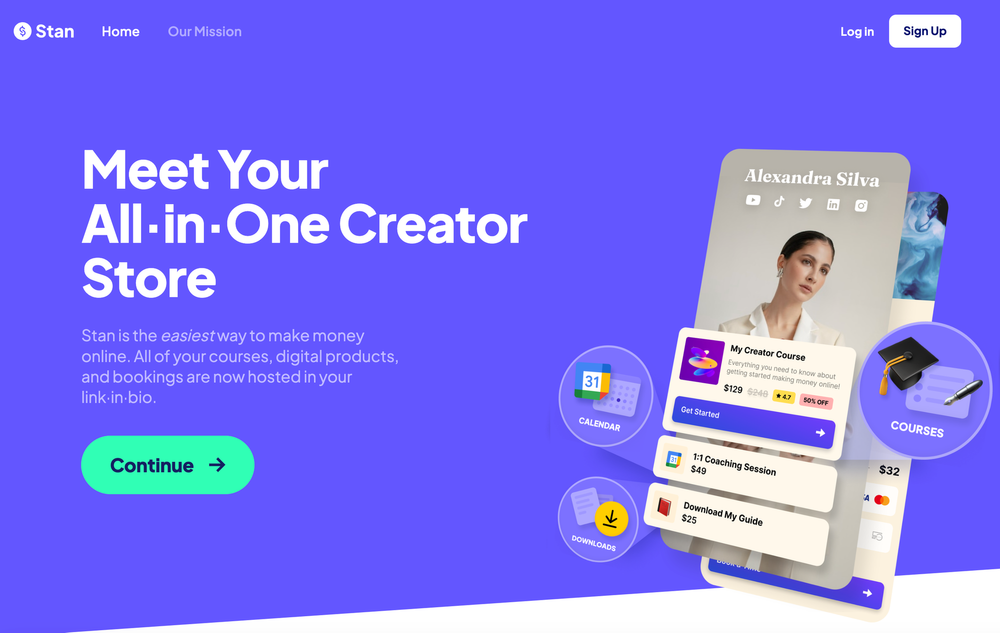
Stan Store is a creator monetization platform and digital marketplace that uses a link-in bio landing page as well as a storefront, while also supporting users with marketing features. It launched in 2020, and eschews transaction fees in favor of a two-tier subscription model costing either $29 per month or $99 per month.
Why You Should Consider a Stan Store Alternative
Stan Store is an excellent option for creators and definitely offers an element of innovation and convenience when it comes to its link-in bio system, but it may not suit every creator. For one thing, the list of benefits offered by Stan Store isn’t actually all that extensive when compared to some of the competition.
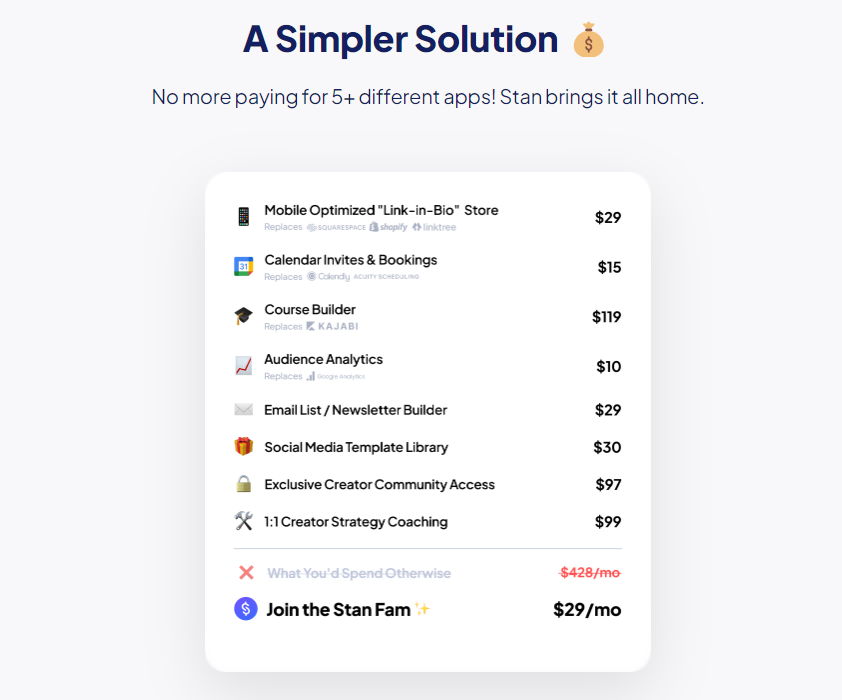
Stan Store does a good job of packaging all of these features together and selling them as a complete package, but when it comes to content monetization, this feature list is just about par for the course when you consider the price on offer.
Many of the alternatives we’ll present in the following section provide you with considerably more features, some of which you may not be able to live without as a creator.
10 Stan Store Alternatives for Creators
#1. 🏆Whop
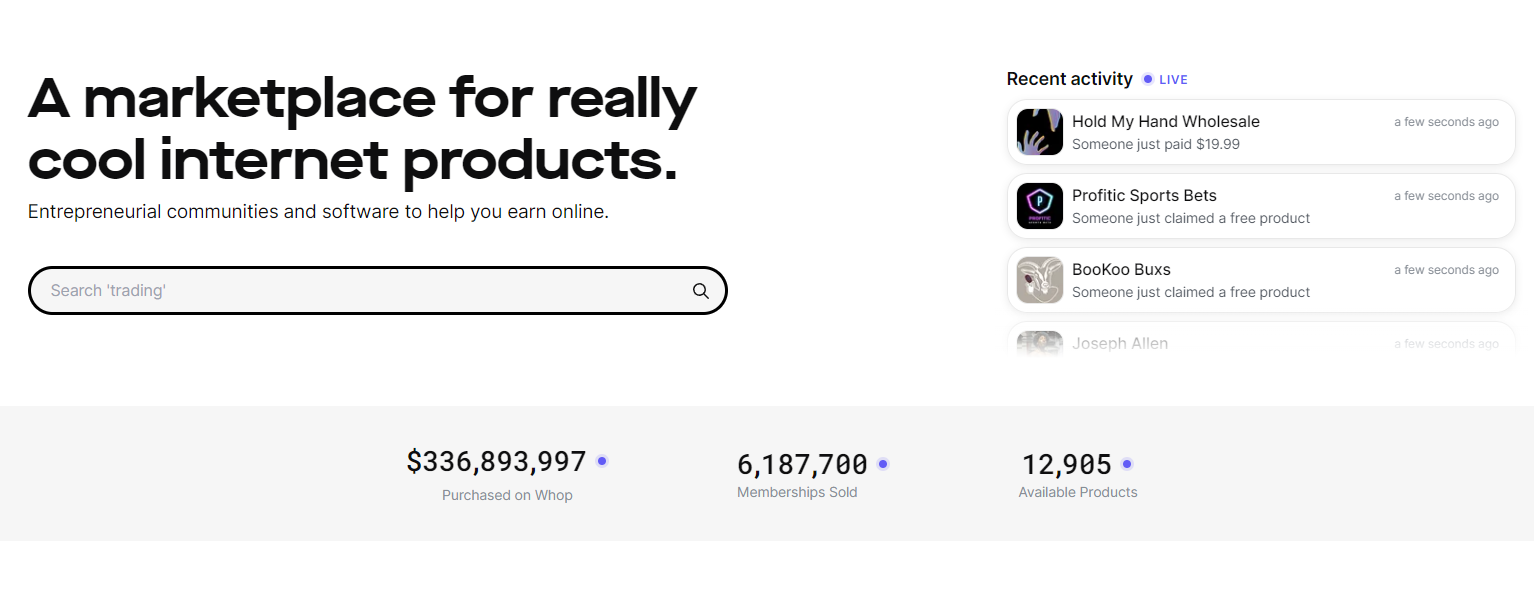
Whop is an all-in-one platform for creators and entrepreneurs that gives you every feature you might need, as well as a couple that the other entries on this list just can’t match. You’ve got all of Stan Store’s key features here, including a course builder and powerful analytics. And while there’s no link-in bio, you can definitely integrate Whop into your website or social media bio.
When you sign up with Whop, you’re getting access to a rock-solid payment processor with Merchant of Record services to ensure that your finances turn over smoothly, and 24/7 customer support to back it up. The Whop Marketplace offers unparalleled discovery, so your digital products will be seen by more eyes—almost none of the other entries on this list will give you added traffic in this way.
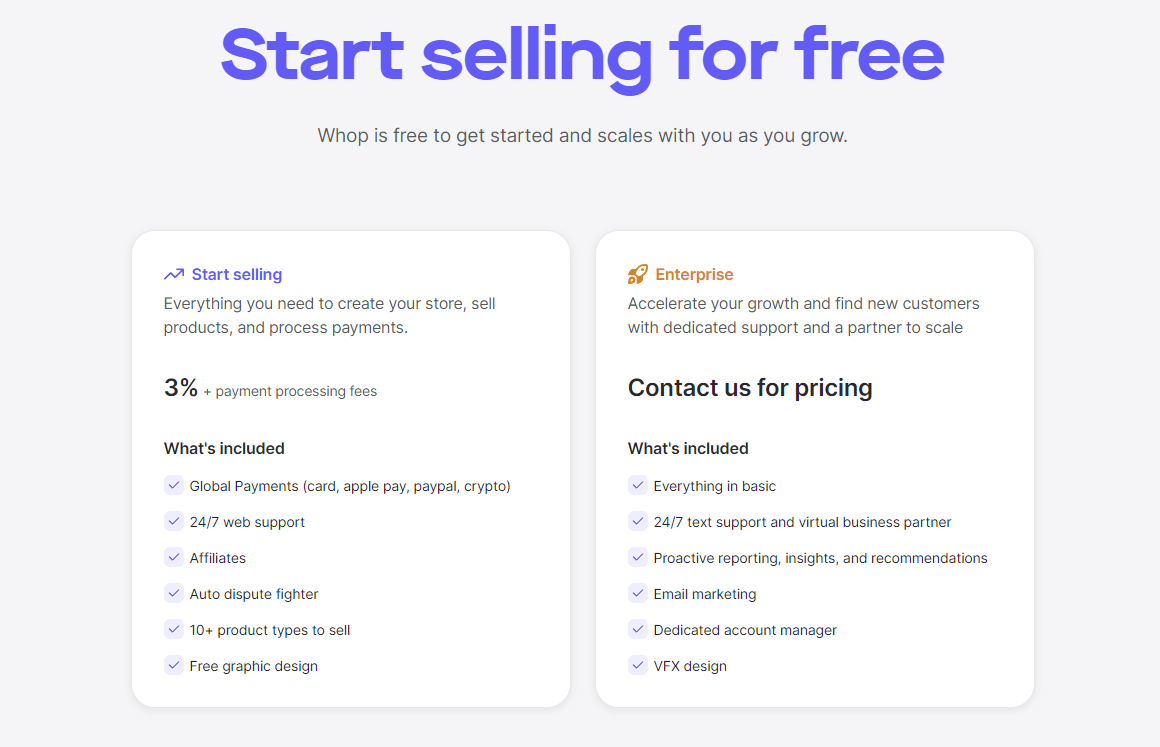
On top of all of the benefits Whop provides, it’s absolutely free to use as a seller. You don’t have to pay any sort of monthly subscription fee, so you don’t have to worry about your revenues being chipped away, especially if you’re just starting off. Whop’s 3% fee is also a lot lower than comparable alternatives!
Whop at a Glance:
- Sell any sort of digital product including courses, memberships, ebooks, PDFs, bots, etc
- Plenty of marketing options including affiliates and coupons
- Marketplace offers significant discoverability
- Payment processor and Merchant of Record
- Free to use, and only a 3% fee per transaction
#2. Gumroad

Gumroad is very similar to Whop in that it allows you to sell a variety of digital products, and they’ve recently updated their platform to bring more discoverability to creators using it. It’s a simple service to sign up with and use, and creators are using Gumroad to sell everything from serial stories and other creative works to personal and professional development products as well as different tools and utilities.
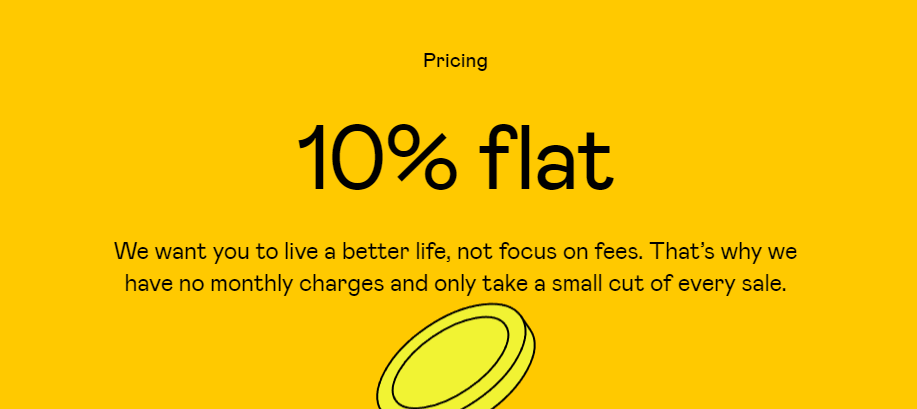
Gumroad keeps it simple when it comes to pricing as well, charging a flat 10% of transactions you conduct on the platform or with the Gumroad integration on your site. This comes in addition to payment processor fees, so either PayPal or Stripe also get a small cut on top depending on what option your customers choose.
Gumroad at a Glance:
- Simple and easy to use platform
- Sell almost any type of digital product
- Gumroad visitors can now find your page more easily than before
- Free to use, but 10% transaction fee before processing fees is a little steep
#3. Shopify

Shopify is one of the biggest names in the business, helping entrepreneurs build their businesses from the ground up. It plays host to millions of merchants and actually contributes to a very significant chunk of US ecommerce (10% according to Shopify themselves).
When you sign up with Shopify you can build your online storefront using a drag-and-drop creator, and customize things however you want using their templates. Shopify Apps can then enhance what you can do with your store. There’s not much you can’t do with Shopify, and just about everything from an admin and marketing point of view is taken care of, right down to a solid analytics framework.
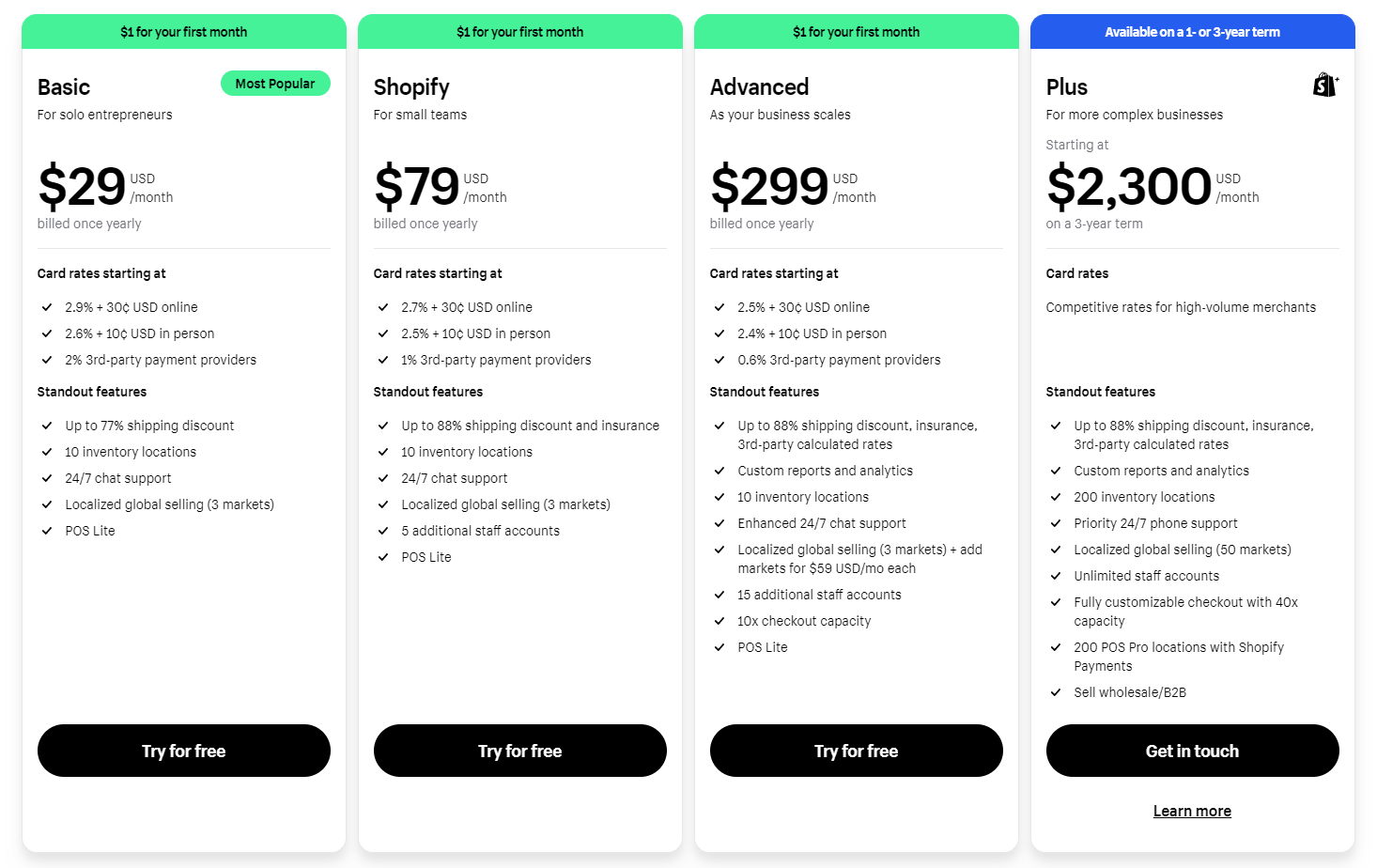
Shopify lets you get on board for free and charges you a minimal amount in your first month, but if you stay on the platform you’ll have to pay full price thereafter—and as is normal for this kind of platform, the fees are quoted monthly but require an annual payment. If you want to pay every month, that basic plan ticks up to $39, with the Shopify option at $105 and Advanced at $399.
Shopify at a Glance:
- Well-known and reputable platform
- Offers physical product options as well as digital
- Multiple sales channels and powerful commerce apps
- May not be well suited to certain creator essential products such as memberships
- Membership fee required to use the platform
#4. Patreon

Patreon is an extremely popular membership platform among creators as it was one of the first to exploit this niche and has since become a go-to name. It’s a platform dedicated to monetizing a creator’s audience, terming them Patrons, and allowing you to set up a feed through which you can deliver exclusive content to your paying supporters.
The platform provides personalization options for your own Patreon page from a selection of templates, and has native video and previews in addition to multimedia publishing. This means that Patreon can do video and audio in a very near way, and it’s got a strong suite of analytics on the back end to help you stay on top of things.
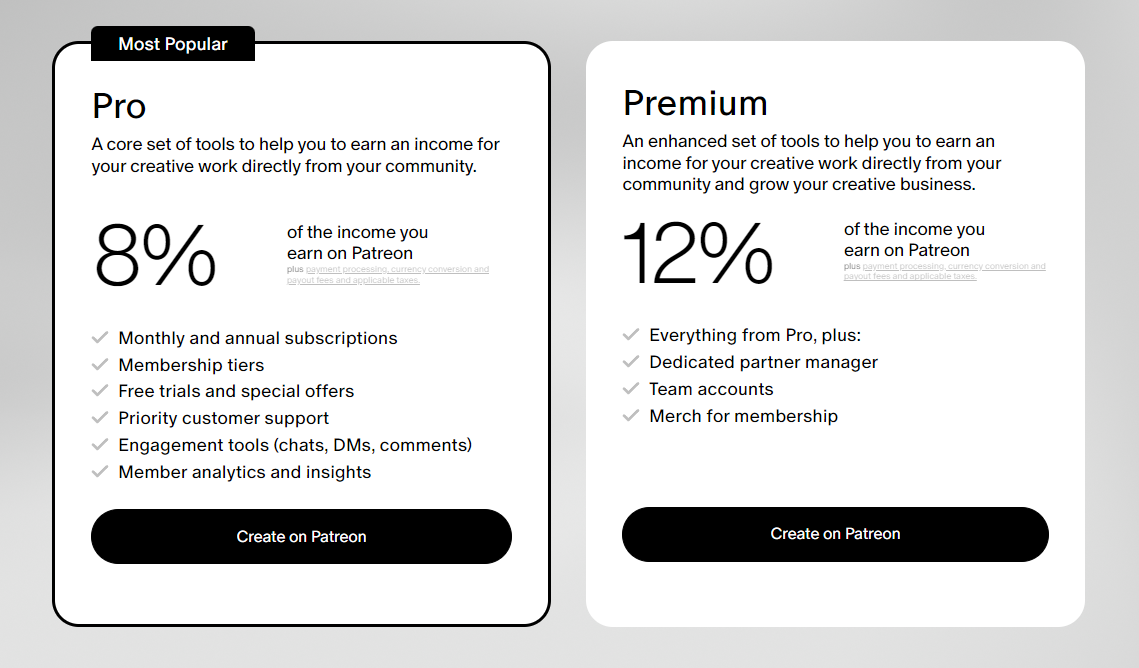
Patreon uses a free model and only charges on transaction fees, but those 8% and 12% options don’t include the additional payment processing fee that’s added on with every platform. As such, Patreon Pro is cheaper than Gumroad and a competitive option if you’re looking mainly at memberships, but Whop can do more at a much lower rate.
Patreon at a Glance:
- Membership-focused platform
- Delivers exclusive multimedia content very well
- Digital products can be sold on your page with 5% fees
- Memberships come in at 8% or 12%
#5. Ko-fi
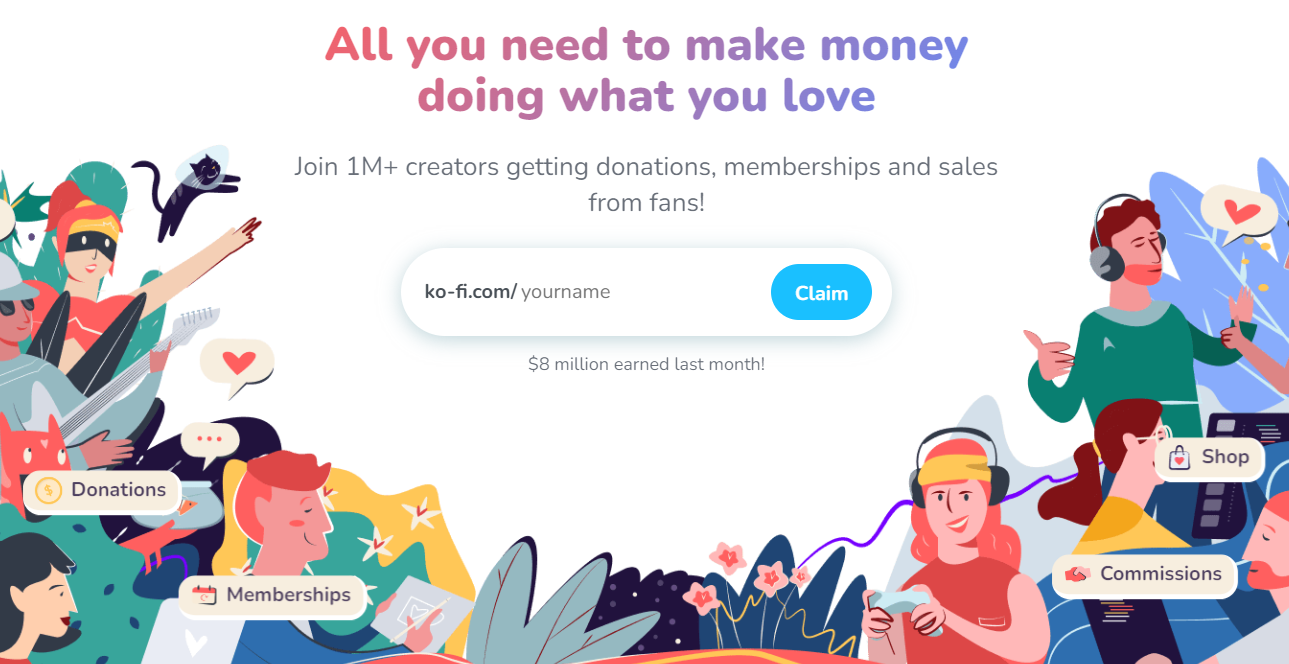
Ko-fi is well known as a Patreon alternative just as it is worth considering if you want to move away from Stan Store. It keeps things extremely simple, and while it focuses on memberships does feature a shop you can sell your creations with—and a great knowledge of its user base means that it also makes commissions easy.
As a creator, Ko-fi can come in really useful with its variety of options. You can crowdfund on the platform, and there’s also an option to get donation alerts while you stream. It’s also easy to discover creators with Ko-fi, so there’s that element of discoverability that you can take advantage of too.
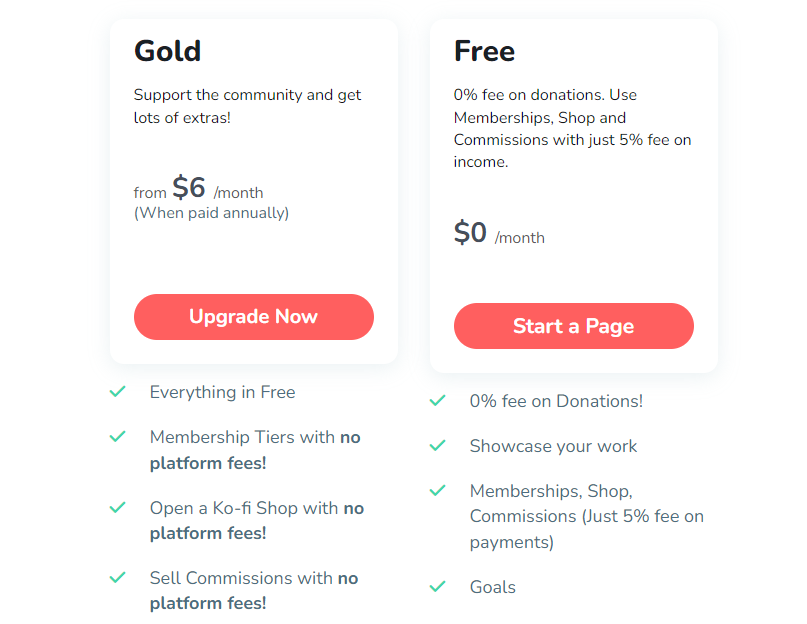
Ko-fi is also extremely competitive on the pricing front, with the free option corresponding to 5% platform fees but the paid Gold plan at just $6 per month (paid annually) letting you skip those fees. It also has to be noted that donations are totally free on KoFi!
Ko-fi at a Glance:
- Extremely creator-friendly platform
- Free donations, and handles things like commissions and memberships well
- Gold plan unlocks a lot of features that aren’t available with Free
- 5% fees on Free can only be bettered by Whop, and $6 per month for Gold is an attractive option even for starting creators
#6. Linktree

Linktree competes with Stan Store primarily, as the name suggests, on the link in bio front. What that means is, you can claim a single linktree link to share everything you create from one place, letting you curate and sell from different social media profiles easily.
This still means you’ll have to set up your stores on these different platforms, but having this option does help you convert more conveniently. Having a Linktree also gives you access to analytics, it integrates well with the tools you already use, and can be customized to match your branding. It can cut down on your workflows, and makes life easy as a creator!
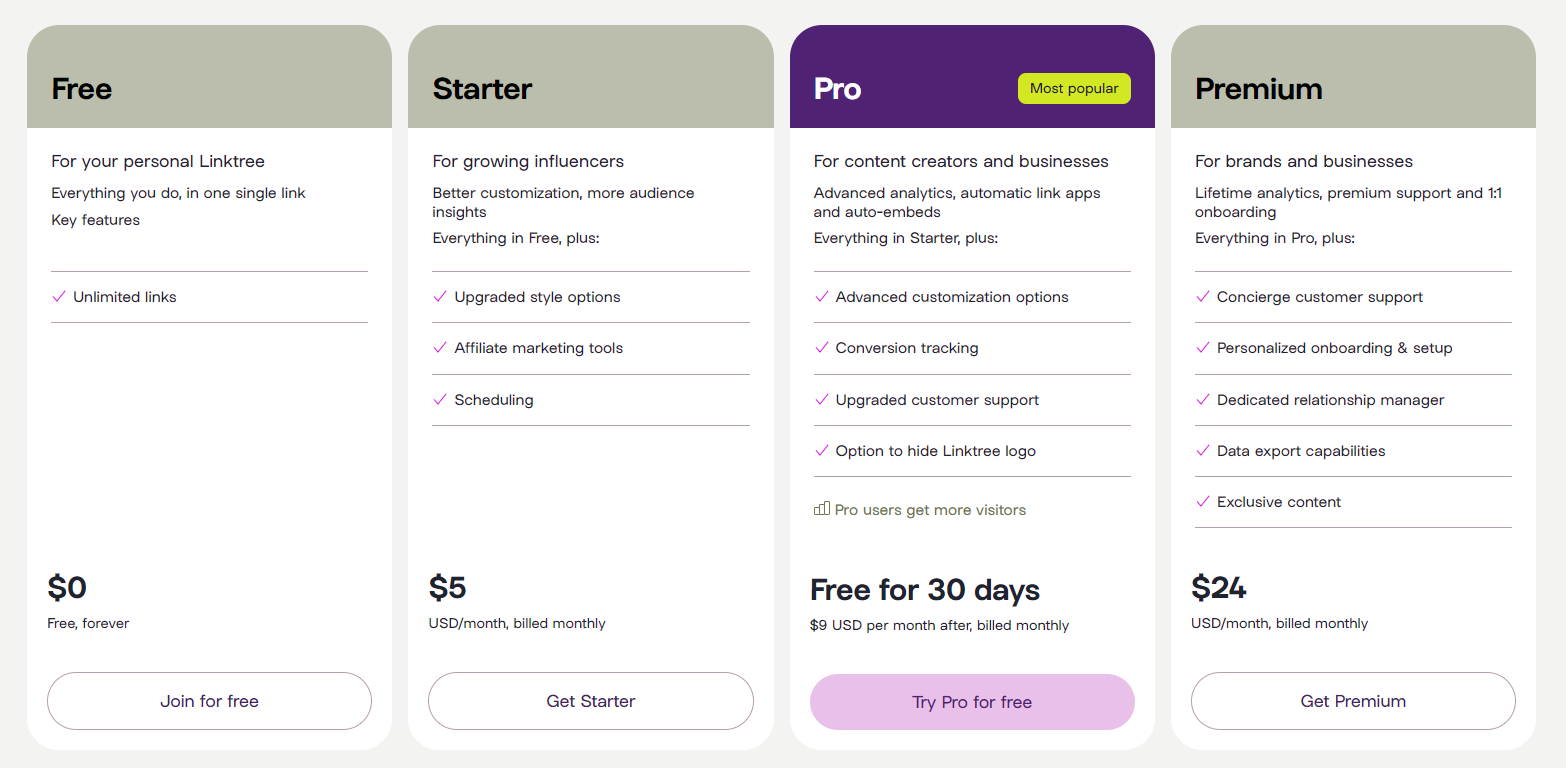
Linktree gives users a free starter option, but as a creator you’ll want the Pro plan at just $9 per month—and that’s paid monthly. You’ll save 30% by paying annually, but Linktree wins points by displaying their true monthly charges by default!
Linktree at a Glance:
- The original link-in-bio option since 2016
- Adds marketing and advanced customization options with paid plans
- You can create a mini-store with Linktree
- Pro option costs just $9 per month (or $7.50 per month if you pay annually)
#7. Kajabi

Kajabi is a premium option as far as Stan Store alternatives go, but that does mean that you’re getting a quality platform to help you turn your content creation into a bona fide business. Specializing in digital products like courses and communities, Kajabi gives you a variety of tools designed to make scaling easy.
From a simple course builder to 24/7 support, you’re getting everything you really need in terms of building your online presence, although the variety of digital products you can sell may be where Kajabi falls short, certainly in comparison to platforms like Whop and Gumroad. Still, everything else is on point, all the way from marketing to payment processing.
Kajabi is a little on the expensive side if you’re just starting out, but it can be a good option if your side hustle is already bringing in a few thousand dollars a month. This can keep Kajabi’s steep subs on the insignificant side, but if you’re going in fresh, signing up will take a bite out of your wallet.
Kajabi at a Glance:
- Premium option for course creators
- Good selection of tools and utilities at all levels of the platform
- Powerful marketing tools and integrations
- On the expensive side with a $55 ($69 if billed monthly) basic plan
#8. Sellfy
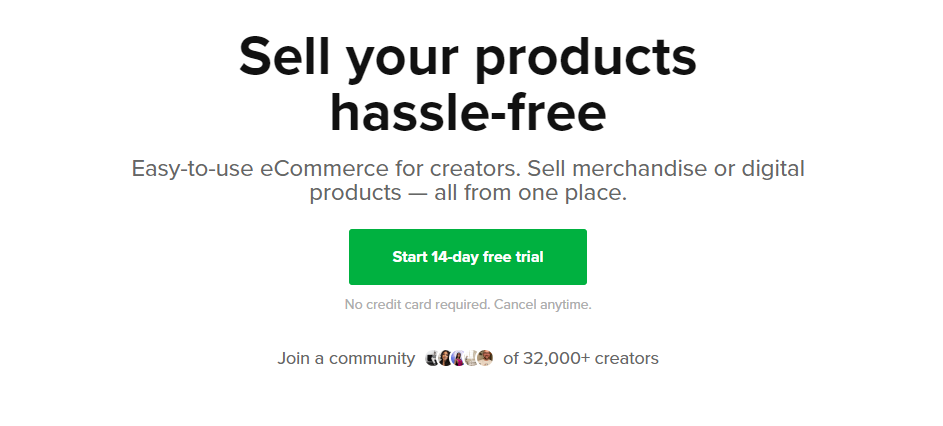
Sellfy is an ecommerce platform that allows you to sell both physical merch and digital products from a single store. You can sign up and get set up quickly, and from then on leverage your custom storefront to make quick sales either directly on your store or via embedding on your own website.
If you’re thinking about adding more physical products to your store than digital ones, Sellfy is an excellent competitor to Shopify and has a couple of perks such as built-in print on demand services.
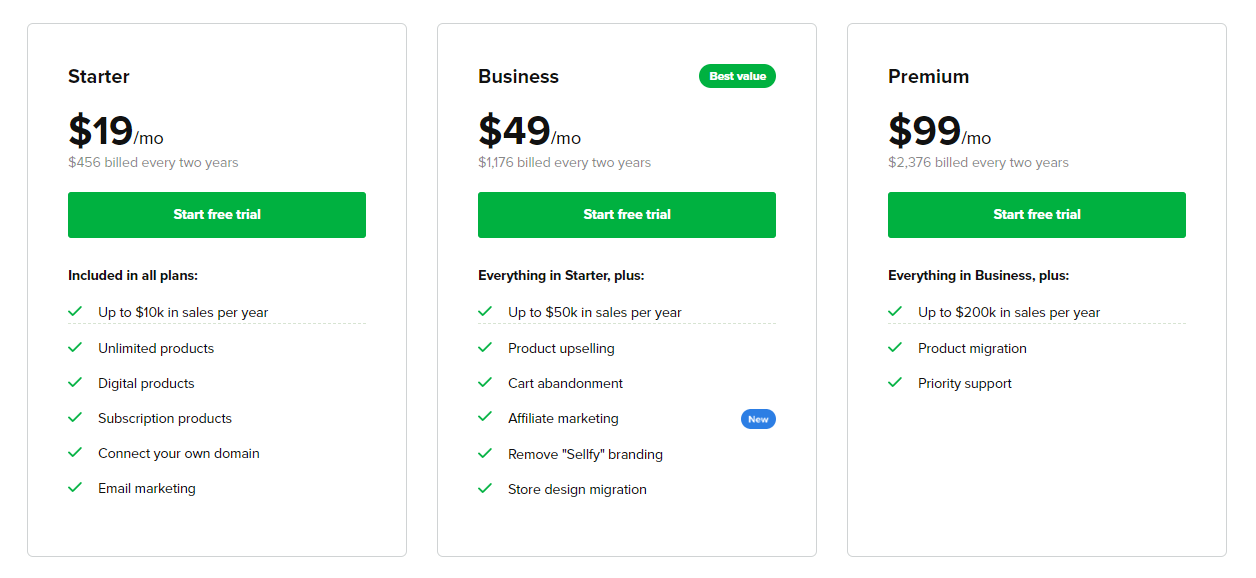
In terms of pricing, Sellfy’s starter package comes in at around $19 if you choose two-year billing, and it offers most of what you need to get started as a creator. Once you’re on your feet, though, you may opt for the Business plan to take advantage of options like upselling, cart abandonment, and the removal of Sellfy branding from your store.
Since Sellfy’s default is two-year billing, this is what the different plans look like if you choose to pay monthly:
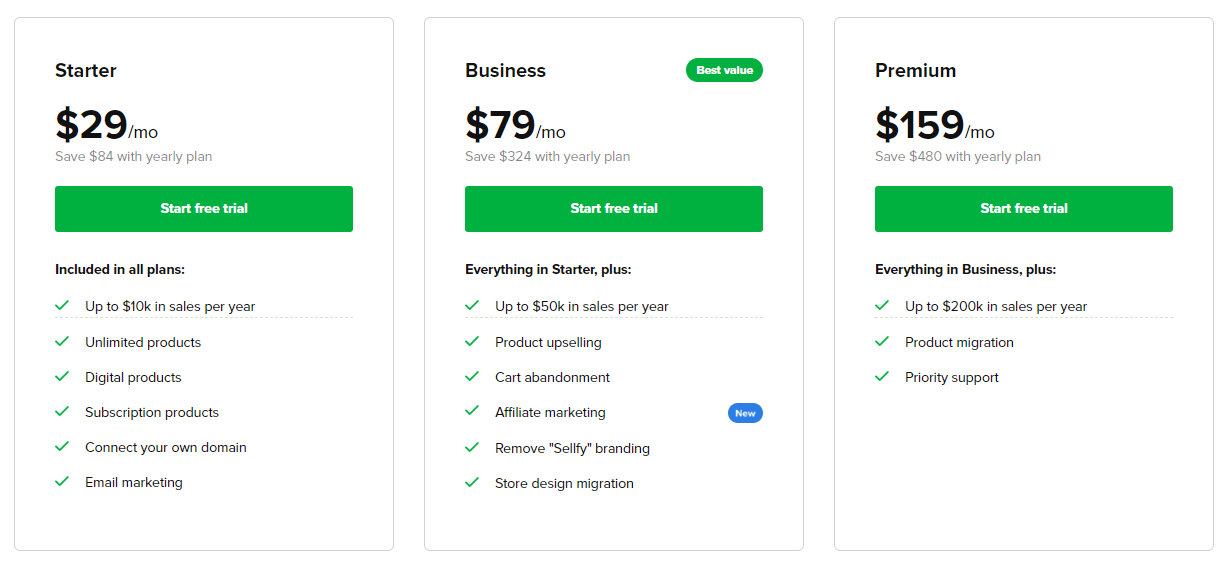
Sellfy at a Glance:
- Creator platform focusing on physical products
- Built-in print on demand service
- Business plan with key features costs $79 per month
- If you’re taking in more than $200k annually you’ll need a bespoke pricing option
#9. Beacons
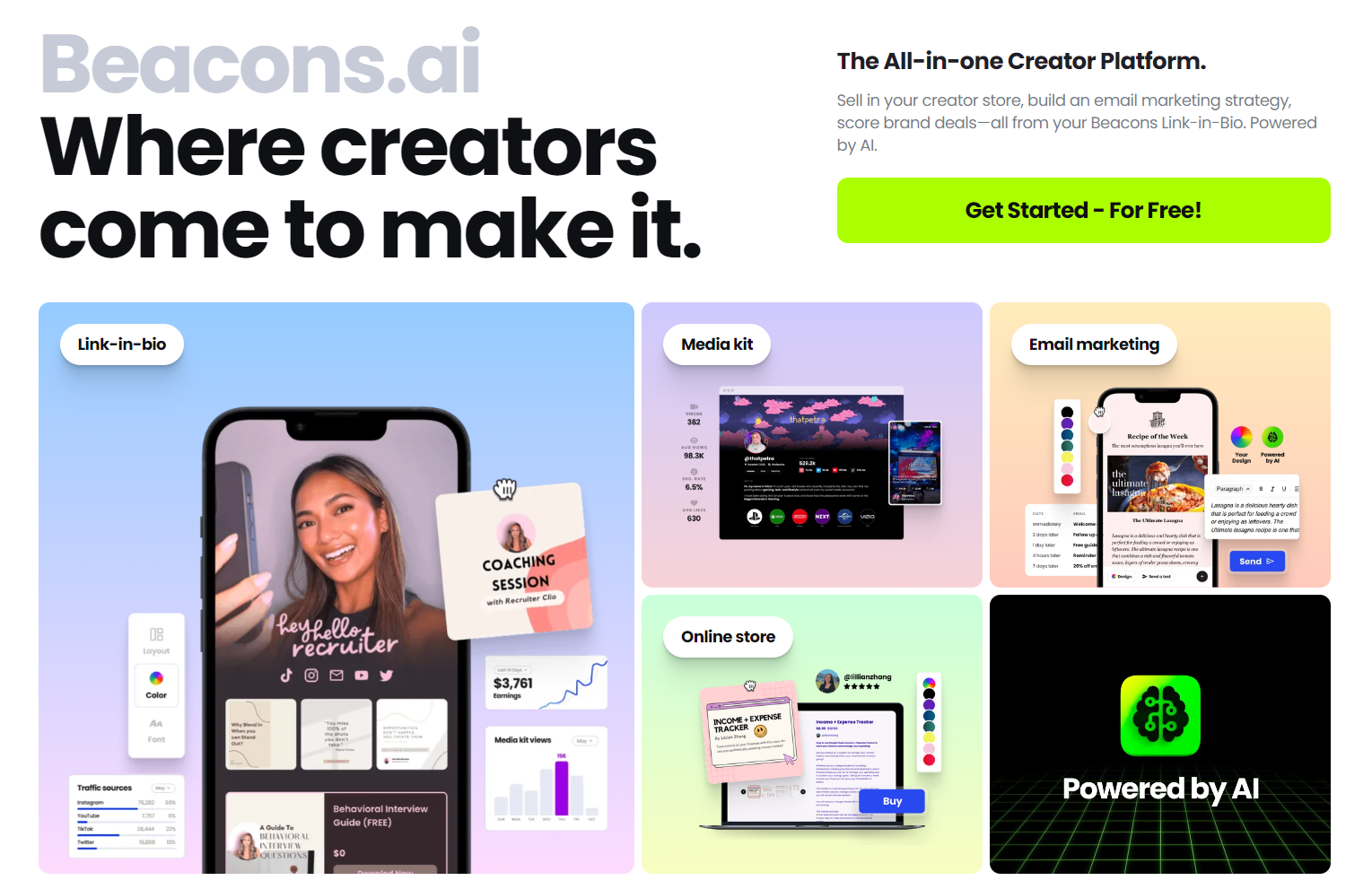
Beacons is a creator platform that offers an AI-powered link-in bio that’s fully customizable, allowing you to put all of your engagement links in one place however you want. The platform features email marketing derived right from that link-in bio, but also offers a full creator store that you can build out in minutes.
Especially interesting for creators is that Beacons offers an auto-updating media kit which allows you to send out pitches much easier when hunting for those all-important brand deals. It’s also got several creator apps to make life easier, such as a W-9 generator, link shortener, and audience manager.
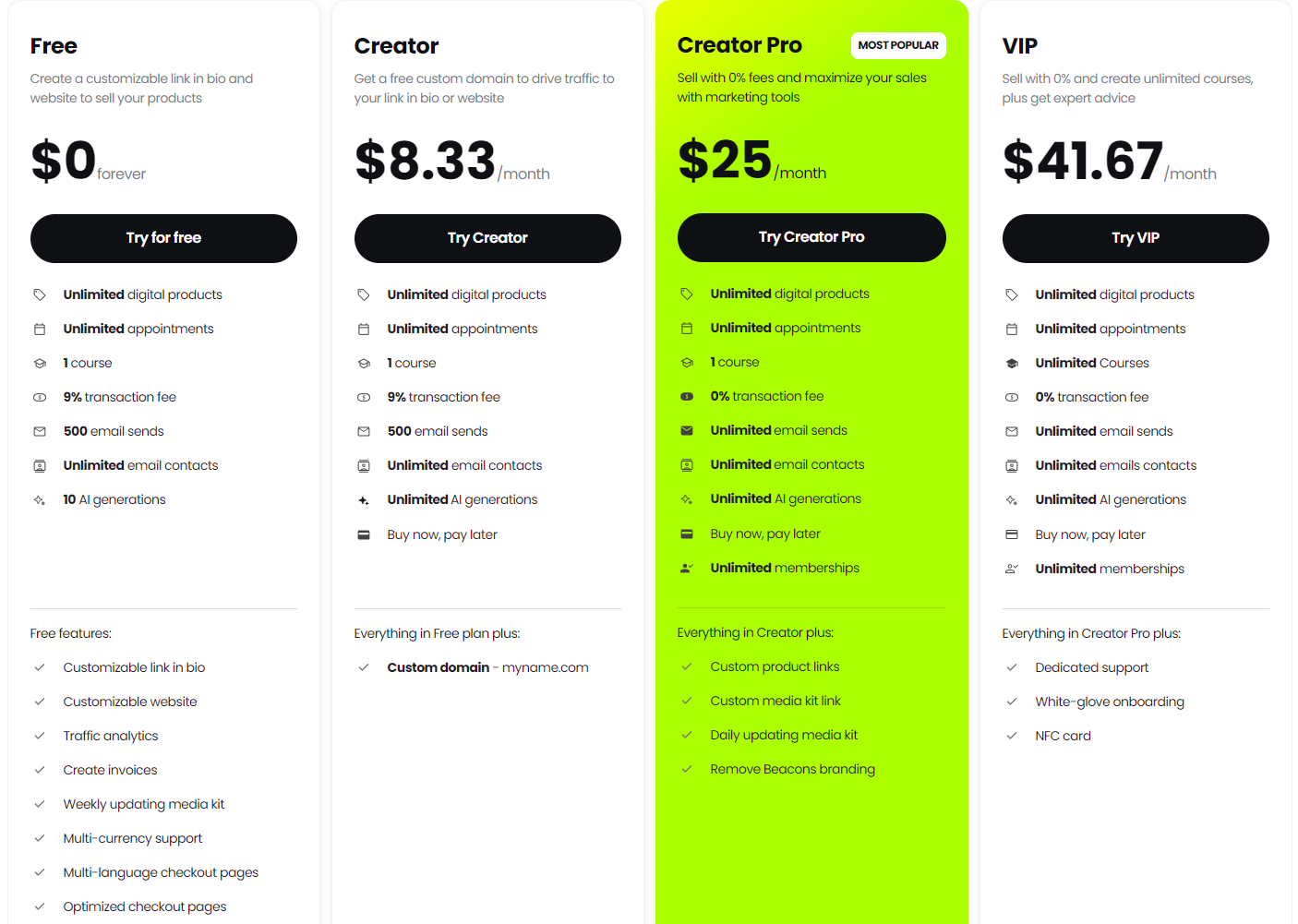
You can try Beacons for free (with a 9% transaction fee) and offer a single course with 10 AI generations, with the latter unlocked when you upgrade to paid plans. The Creator Pro plan is a bit of a jump at $25 a month (paid annually) but it does let you get rid of Beacons branding as well as the transaction fee.
Beacons at a Glance:
- AI powered creator platform
- Create an online store and link-in bio
- Custom, daily updating media kits and custom domains
- Plenty of features available for free
- 9% transaction fee with free and basic plan, no transaction fee with Creator Pro and above
#10. Pensight

Pensight is another creator platform offering a link-in bio store that you can roll all of your digital product offerings into. You can sell various types of digital products using your easy-to-build store, and the platform pays a lot of attention to collecting and then utilizing all of the emails you can collect.
Pensight also allows you to sell courses and deliver exclusive subscriber content to members, carry out coaching sessions, and generally create a versatile portfolio of offerings for your most dedicated supporters.
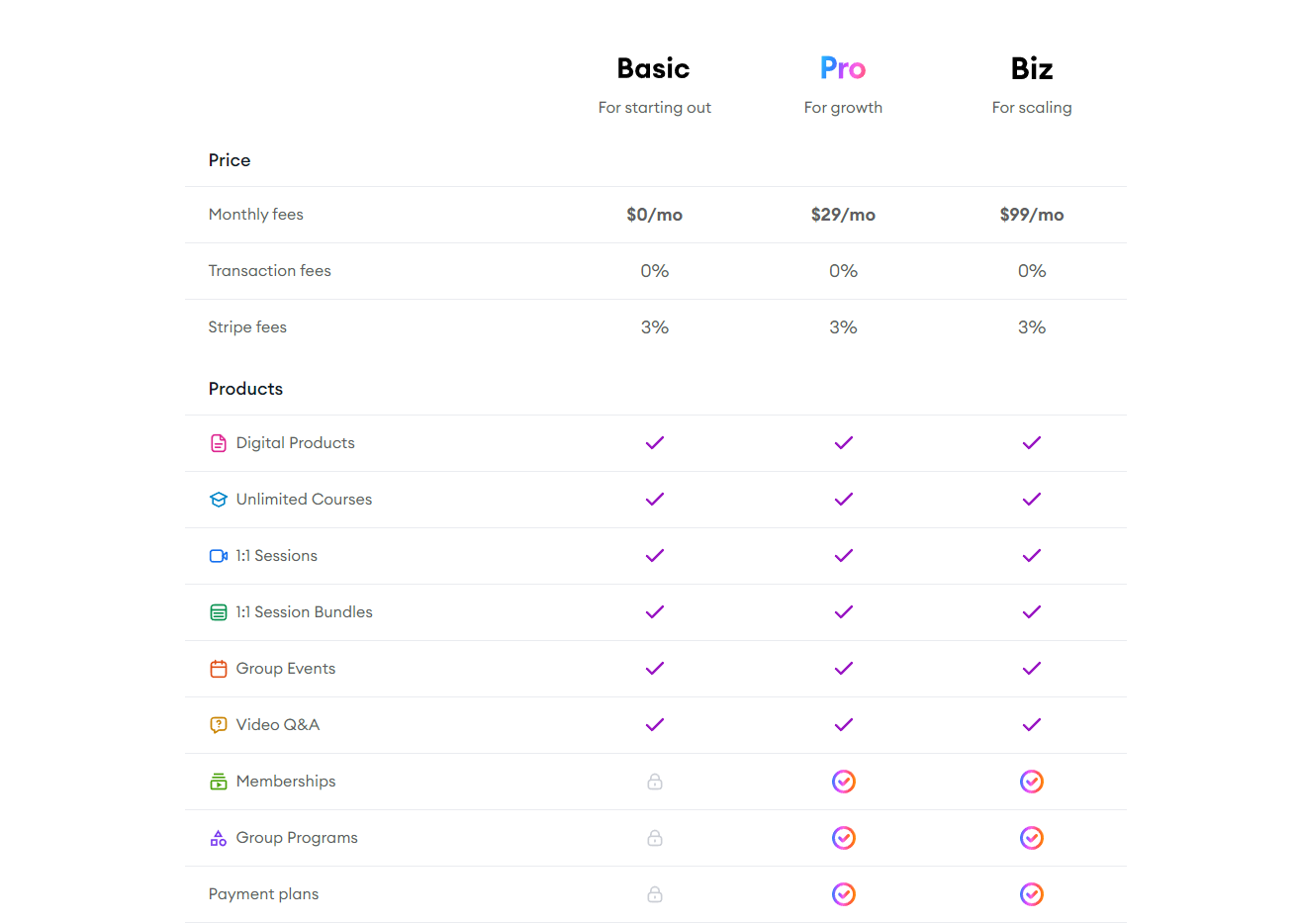
You can start off on Pensight for free, but if you’re serious about your content and monetizing your audience, you’ll want either the pro or business packages at $29 or $99 respectively. The free plan only has the most basic of features, and doesn’t include things like memberships and subscription payments.
Pensight at a Glance:
- All in one platform with link-in bio store
- Sell a variety of digital products
- Most critical features are on the paid plans
- Pro plan costs $29 per month
What to Consider When Choosing a Stan Store Alternative
When you choose a Stan Store alternative, it’s good to think about where you are in your content creation journey and exactly which sort of revenue streams you want to introduce when it comes to monetizing your audience.
For example, if you’re just starting off and trying to bootstrap your new business, picking an expensive platform like Kajabi may not be the way to go. The premium platforms take a big bite out of your revenues, and you may not be able to pay the cheaper annual rates in one go, trapping you with more expensive monthly subs.
Your strategy in terms of what products you want to offer may also dictate where you go. A membership-focused option like Patreon, for example, may not be a great idea if subscriptions just aren’t a natural fit for your audience and you're looking to simply sell digital products.
Monetize Your Content with Whop!
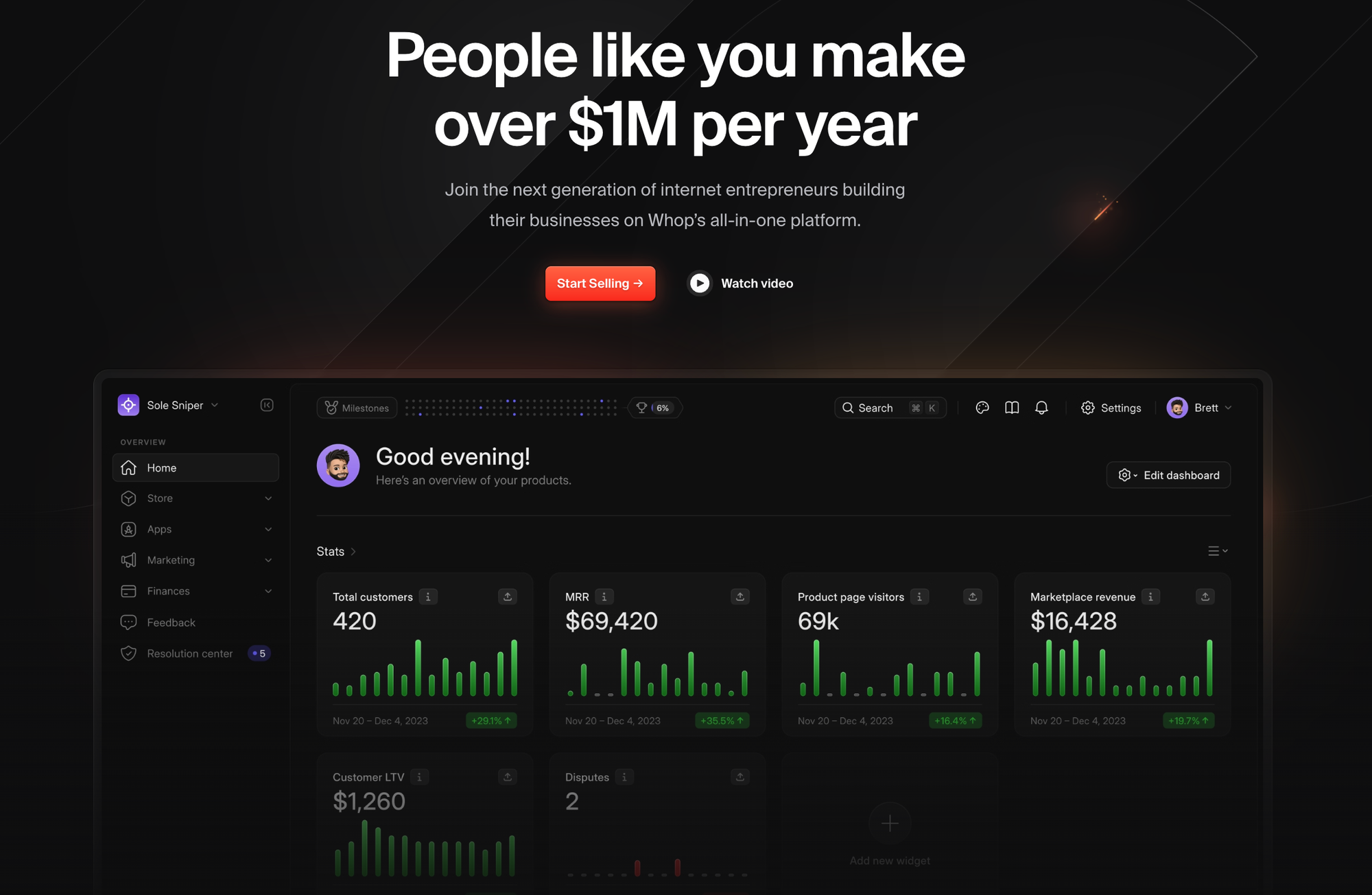
The number one Stan Store alternative is Whop - and with good reason. As we have already outlined, Whop caters to everyone, from newer influencers, to solopreneurs, and experienced businesses alike. Plus, with only a 3% transaction fee, Whop's pricing doesn’t affect your revenues at either end of the scale.
On top of that, Whop offers unparalleled customization. When you create your Whop hub (your online business) you fill it with the apps and features best suited to you. From hosting a community chat, to selling courses, facilitating video calls and classes, selling ebooks, and so much more, with Whop you can do it all.
So, whether you want to sell a digital product like a tool, a bot or a course or monetize your audience by creating a membership, then back that business up with the best customer service, analytics and payment processing platform possible, Whop is the platform for you. Check out the site or talk to the team at Whop today!



